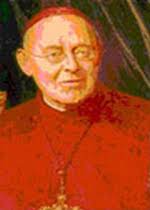New Barnet and the Spiritans
In the 1930s the Holy Ghost Fathers (the Spiritans) had two communities both situated in Lancashire. Near Grange-over-Sands and on the edge of the Lake District was a Mansion built in 1779-80, called Castlehead. It had ornamental gardens, four lodges and 64 acres of arable land and was bought in 1907 for £5,970 10. 5d and used both as a Brothers’ Novitiate and a Junior Seminary for those young boys wishing to see whether they had a Missionary Vocation.
Further south lay the parish of Peasley Cross, situated about an hour’s journey from the Liverpool docks. On 1 October 1912 it was taken on with the intention of giving the early Spiritans (mainly Irish) some pastoral outreach in the Archdiocese of Liverpool and at the same time providing a base for those priests travelling by boat to and from the missions in West Africa.
What was missing was a Novitiate and a Senior Seminary and so all the junior seminarians who survived the rigours of Castlehead were sent to France, with as much spoken French as they had managed to pick up in their years of secondary education. It was not ideal, and with the strong possibility of a world war limiting travel to Europe, an alternative set-up had to be found.


Negotiations for admission to Westminster Diocese were started with Cardinal Bourne, the Archbishop of Westminster. In a letter dated 12 August 1934 he suggested buying or building a house in Cockfosters and allowing the local Catholics attend Mass on Sundays. This Mass-Centre would eventually develop into a full blown parish which would financially help the Spiritans set up a house of studies. In the meantime by means of the tube students could easily reach Russell Square and attend lectures in the Jesuit College. Sadly the project never got off the ground because the Spiritans did not have the money to build or buy a community house in Cockfosters. A second suggestion was to take on the area round South Oxhey near Carpenders Park rail station. But Fr Letourneur (the General Spiritan Bursar living in Paris) refused to accept the financial conditions laid down by the Archdiocese, and on 12 February 1935 the Spiritans decided to withdraw their application for admission to the Diocese.
A sea change occurred with the appointment of Archbishop Arthur Hinsley to the See of Westminster on 25 March 1935. He was already known to English speaking missionaries, including the Spiritans, for he had been Apostolic Delegate to the British Territories with a residence in Mombasa. In reply to a Spiritan letter of congratulations on his appointment he wrote back: “Your letter of 30 March has filled me with consolation. You will understand that my interest and my activity will always be directed to the Missions. For the Holy Ghost Fathers, and more particularly for the English Province, I have a great affection, and I promise you I shall always do my best to help in any way your great work… I shall always welcome you at Westminster, especially if you come to bring me word of anything I can do to help and encourage you.”
Following this letter a new set of negotiations began. At one point there was talk about a possible new mission “at a place called Cranford”. But on 16 April 1937 the Archbishop wrote offering “the already established parish of New Barnet. There is a small church, or rather chapel, there but no Presbytery and no schools. The chapel is a sorry looking affair and one wall has had to be shored up to prevent it from collapsing, but the Diocese has already bought a good site for a proper church. It is an area that I very much want to be developed spiritually and one where I feel sure that your Fathers would be warmly welcomed by the people.” In a prescript the Archbishop added, “The present priest in charge leaves New Barnet in a fortnight. Could you please consider the offer as soon as possible?”
The offer was accepted by return of post and Fr Parkinson was appointed and took over the parish from Fr Lynch “during the week following Trinity Sunday, 23 May”. He also took up residence in the rooms previously occupied by Fr Lynch in Lyonsdown Road.
(Sources used: letters and documents in the Spiritan Archives, Bickley, Bromley Kent; and Fr Wilfrid Gandy’s The Holy Ghost Fathers in England 1792-1945.)
